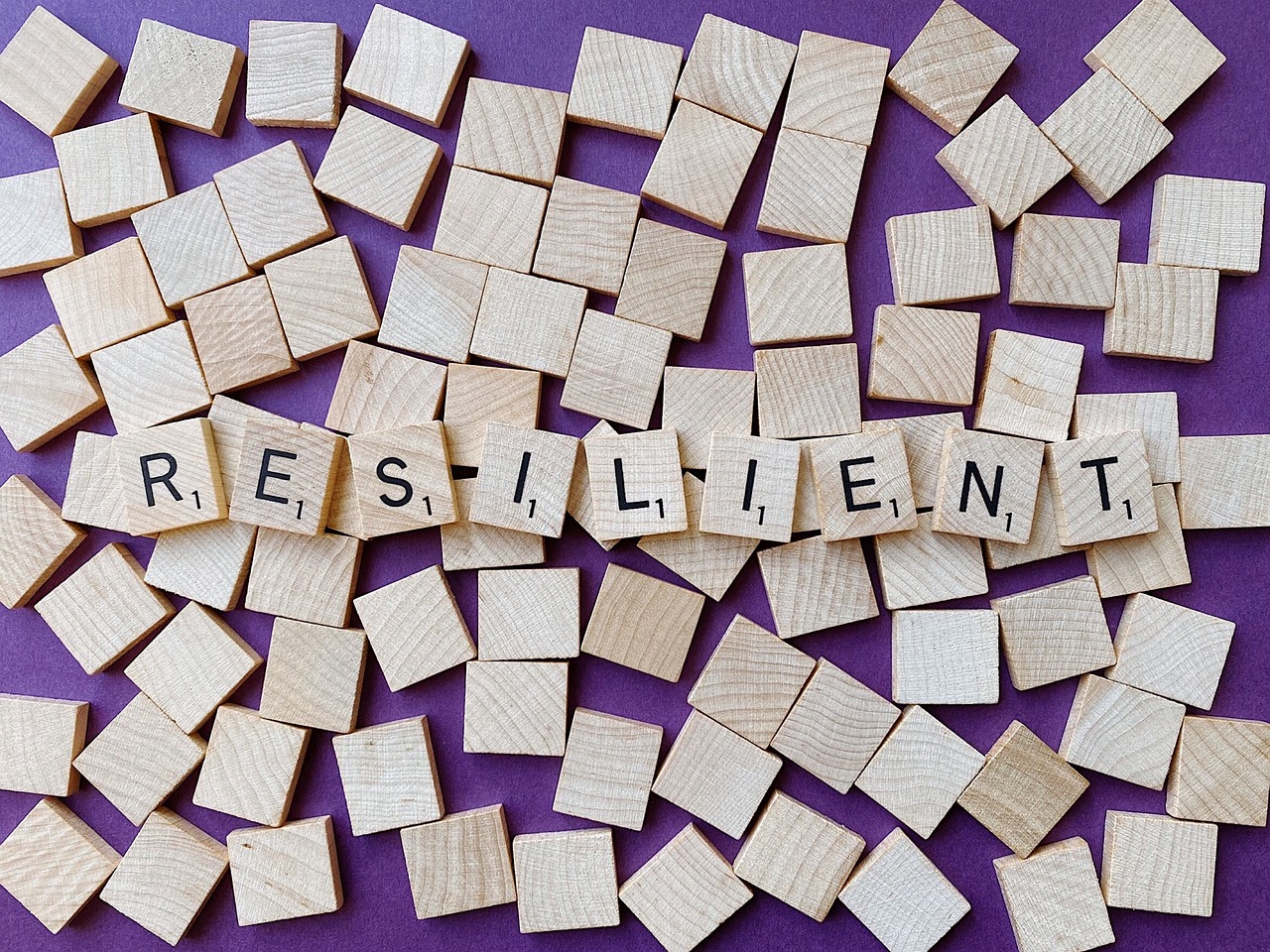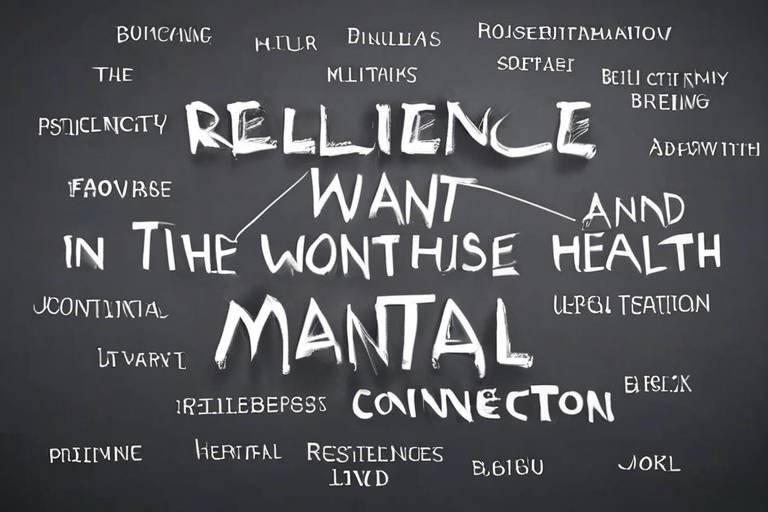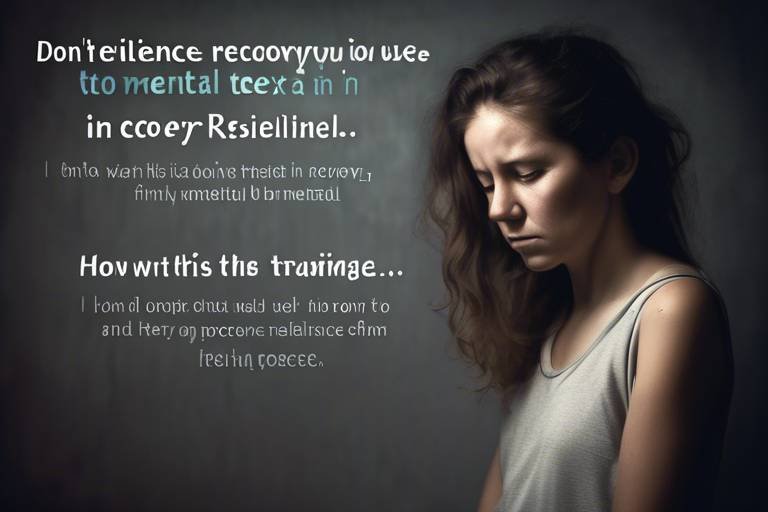Leveraging Resilience to Overcome Personal Tragedies
Life has a way of throwing curveballs at us, doesn’t it? Whether it’s the loss of a loved one, a sudden job loss, or a health crisis, personal tragedies can feel overwhelming. But here’s the good news: resilience is like an emotional trampoline that can help us bounce back from these tough times. It’s not just about enduring the pain; it’s about using that pain as a stepping stone toward growth and recovery. In this article, we’ll dive deep into what resilience really means, how it operates within us, and most importantly, how we can harness it to not just survive, but thrive after facing adversity.
So, what exactly is resilience? At its core, resilience is the ability to adapt and recover from setbacks. Think of it as your mental armor, helping you weather the storms of life. It’s crucial because without it, personal challenges can feel like insurmountable mountains. Resilience isn’t just about bouncing back; it’s about growing through the experience. It allows us to learn from our struggles, fostering emotional and psychological recovery. Imagine being a tree in a storm—those that bend but don’t break are the ones that stand tall again, often stronger than before.
Now, let’s get a little nerdy for a moment and explore the science behind resilience. Research has shown that resilience is influenced by a mix of psychological and biological factors. On the psychological side, traits like optimism and emotional regulation play a significant role. On the biological side, genetic predispositions and our brain's responses to stress can shape how resilient we are. The fascinating part? Many of these factors can be developed and strengthened over time. So, if you feel like you’re not resilient now, don’t worry! You can build it.
When we talk about resilience, we can’t overlook the psychological factors that enhance it. For instance, having a positive outlook—what we often call optimism—can significantly influence how we respond to adversity. It’s like wearing rose-colored glasses; they help you see the potential for a brighter tomorrow, even when today feels dark. Emotional regulation is another key player. It involves managing your emotions effectively, especially during crises. Think of it as steering your ship through rough waters; with the right skills, you can navigate through the storm.
Optimism isn’t just wishful thinking; it’s a powerful tool that can help you navigate through tough times. When faced with difficulties, optimistic individuals tend to focus on solutions rather than problems. This positive mindset can be the difference between feeling defeated and feeling empowered. Instead of asking, "Why is this happening to me?" an optimistic person might ask, "What can I learn from this experience?" This shift in perspective can open doors to recovery and growth.
Now, let's talk about emotional regulation techniques. These are strategies that can help you manage your emotions effectively during crises. Techniques like mindfulness and cognitive reframing can be incredibly helpful. Mindfulness encourages you to stay present and aware, reducing anxiety about the future. Cognitive reframing helps you view situations from a different angle, turning negative thoughts into positive ones. By practicing these techniques, you’re essentially giving yourself a toolkit to handle life’s challenges.
On the flip side, let’s not forget the biological factors that contribute to resilience. Our genetic makeup can predispose us to certain emotional responses. For example, some people may have a natural inclination to bounce back quickly from stress, while others may struggle more. Additionally, our brain's neurobiological responses to stress play a crucial role. Understanding these biological underpinnings can help us appreciate the complexity of resilience and recognize that it’s not solely a matter of willpower.
So, how do we actually build resilience? It’s not just about understanding the concept; it’s about taking actionable steps. One of the most effective ways to cultivate resilience is by developing a strong support network. Surrounding yourself with friends, family, and community members can provide you with the emotional backing you need during tough times. Think of it as creating a safety net that catches you when you fall.
Building and maintaining relationships is crucial for resilience. When you have people to lean on, you’re less likely to feel isolated in your struggles. Share your feelings, seek advice, and don’t hesitate to ask for help. Remember, it’s not a sign of weakness; it’s a sign of strength to reach out. Your support network can provide different perspectives and encouragement that can be invaluable during challenging times.
Another essential strategy for enhancing resilience is practicing self-care. It’s easy to neglect your own needs when life gets tough, but taking care of yourself is vital. Engage in physical activities, eat healthily, and practice relaxation techniques. Think of self-care as charging your emotional battery; the more you invest in yourself, the more energy you’ll have to face life’s challenges. Simple practices like meditation, yoga, or even a walk in nature can do wonders for your emotional well-being.
- What is resilience? Resilience is the ability to adapt and recover from setbacks, learning and growing from the experience.
- How can I become more resilient? You can build resilience by developing a strong support network, practicing self-care, and employing emotional regulation techniques.
- Is resilience something we are born with? While some aspects of resilience are influenced by genetics, many psychological traits can be developed and strengthened over time.
- Can resilience help me in everyday life? Absolutely! Resilience can improve your overall emotional well-being and help you cope with daily challenges more effectively.

Understanding Resilience
Resilience is more than just a buzzword; it’s a fundamental trait that empowers individuals to recover from setbacks and challenges. Imagine resilience as a rubber band: when stretched, it may feel uncomfortable, but it has the remarkable ability to return to its original shape. In the context of personal tragedies, resilience allows people to navigate through life’s storms, emerging not just intact, but often stronger and wiser. This ability to bounce back is crucial for emotional and psychological recovery, making it a vital component in overcoming personal challenges.
So, why is resilience so important? Well, life is full of unexpected twists and turns. From the loss of a loved one to job loss or health issues, everyone faces adversity at some point. Resilience acts as a buffer, helping individuals manage stress and maintain a sense of hope. It’s like having an internal compass that guides you through the fog of despair, allowing you to find your way back to calm waters.
Moreover, resilience is not a fixed trait; it can be developed and strengthened over time. Just as muscles grow stronger with exercise, our capacity for resilience can be enhanced through experience and practice. This means that even if you feel overwhelmed by a tragedy right now, there’s always room for growth. Building resilience involves cultivating a variety of skills and mindsets, which can be tailored to fit your unique circumstances.
To better understand resilience, it’s helpful to break it down into several key components:
- Adaptability: The ability to adjust to new circumstances and challenges.
- Emotional Awareness: Recognizing and understanding your feelings, which is essential for managing them effectively.
- Support Systems: Having a network of friends and family who can provide assistance and encouragement.
- Problem-Solving Skills: The capability to identify solutions and take proactive steps to address challenges.
In essence, understanding resilience is about recognizing its multifaceted nature. It’s not just about enduring hardships but also about thriving in their aftermath. By fostering resilience, individuals can transform their experiences of adversity into opportunities for personal growth and renewal. So, whether you’re currently facing a personal tragedy or simply looking to strengthen your emotional toolkit, embracing resilience can lead to a brighter, more hopeful future.
Q: Can anyone develop resilience?
A: Absolutely! Resilience is a skill that can be cultivated by anyone, regardless of their background or past experiences.
Q: What are some practical ways to build resilience?
A: Some effective strategies include practicing self-care, developing strong relationships, and learning problem-solving skills.
Q: Is resilience the same as being tough?
A: Not quite. While toughness implies a certain level of endurance, resilience encompasses emotional awareness and the ability to adapt and grow from experiences.

The Science of Resilience
This article explores the concept of resilience and how it can be harnessed to navigate through personal tragedies, offering insights and strategies for recovery and growth.
Resilience is the ability to bounce back from adversity. This section defines resilience and discusses its importance in overcoming personal challenges and tragedies, highlighting its role in emotional and psychological recovery.
Understanding the science behind resilience can feel like unlocking a treasure chest of human potential. It’s not just about toughing it out; it’s about how our minds and bodies respond to adversity. Research shows that resilience is a complex interplay of psychological and biological factors that can be nurtured and developed over time. This section dives into the fascinating world of resilience, exploring what makes some people more adaptable than others when faced with life's challenges.
At the heart of resilience lie various psychological attributes that enhance our ability to cope with difficulties. For instance, traits such as optimism, emotional regulation, and social support are crucial. Optimism isn’t just a sunny disposition; it’s a powerful tool that can help individuals see challenges as temporary setbacks rather than insurmountable obstacles. Emotional regulation, on the other hand, involves managing our feelings and reactions during tough times. This can be likened to having a well-tuned instrument; when we can control our emotional responses, we can play a more harmonious tune in the face of adversity.
Optimism can significantly influence resilience. When you approach life with a positive outlook, it’s like wearing a pair of rose-colored glasses that allow you to see opportunities where others see only problems. Studies have shown that optimistic individuals tend to recover from setbacks more quickly and are more likely to engage in proactive coping strategies. This mindset fosters a belief in one’s ability to overcome obstacles, which is essential for resilience.
Effective emotional regulation strategies can bolster resilience. Techniques such as mindfulness and cognitive reframing are invaluable tools in this regard. Mindfulness encourages individuals to stay present and fully engage with their emotions without being overwhelmed by them. It’s akin to being the calm eye of the storm, where you can observe the chaos around you without getting swept away. Cognitive reframing, on the other hand, involves changing the way we perceive a situation. By viewing challenges as opportunities for growth, we can transform our emotional responses and enhance our resilience.
While psychological factors play a significant role in resilience, we must also consider the biological underpinnings. Genetic predispositions can influence how we respond to stress and adversity. For example, certain genetic traits may enhance our ability to manage stress hormones, making it easier for some individuals to bounce back after experiencing trauma. Additionally, neurobiological responses, such as the functioning of neurotransmitters like serotonin and dopamine, can affect our mood and resilience levels. Understanding these biological factors helps us appreciate that resilience is not solely a matter of willpower or attitude; it is also rooted in our biology.
Practical strategies for cultivating resilience are discussed in this section, offering actionable steps individuals can take to strengthen their resilience and better equip themselves to face future challenges.
A strong support network is crucial for resilience. This subheading emphasizes the importance of building and maintaining relationships with friends, family, and community members during difficult times.
Self-care practices play a vital role in enhancing resilience. This section details various self-care strategies, including physical activity, healthy eating, and relaxation techniques, that can support emotional well-being and recovery.
- What is resilience? Resilience is the ability to recover quickly from difficulties and adapt well to adversity.
- Can resilience be learned? Yes, resilience can be developed through various psychological and emotional strategies.
- What role does support play in resilience? A strong support network can provide emotional and practical assistance, enhancing an individual’s resilience during tough times.
- How can I improve my emotional regulation? Techniques like mindfulness and cognitive reframing can help improve emotional regulation.

Psychological Factors
When we think about resilience, we often focus on the big, dramatic events that test our strength. However, the that enhance resilience are just as critical, if not more so. These factors are like the internal tools we carry in our mental toolbox, ready to help us navigate through life's storms. At the forefront of these tools are attributes such as optimism, emotional regulation, and the presence of a supportive social network. Each of these elements plays a pivotal role in how we cope with challenges and emerge stronger from them.
Let’s dive deeper into these psychological factors. First, consider optimism. It’s not just about wearing rose-colored glasses; it’s about having a mindset that believes in the possibility of a better tomorrow. Optimism can serve as a beacon of hope during dark times. Studies have shown that individuals with an optimistic outlook tend to experience lower levels of stress and anxiety, which can significantly enhance their ability to bounce back from adversity. Think of it this way: if resilience is a muscle, optimism is the protein that helps it grow stronger.
Next up is emotional regulation. This is the ability to manage and respond to your emotional experiences effectively. It’s about recognizing your feelings, understanding them, and choosing how to react. Techniques like mindfulness and cognitive reframing can be incredibly helpful here. Mindfulness encourages you to stay present and aware, while cognitive reframing allows you to change your perspective on a situation. For instance, instead of viewing a setback as a failure, you might see it as a learning opportunity. This shift in thinking can drastically alter your emotional response and improve your resilience.
Finally, let’s not underestimate the power of a support network. Humans are inherently social creatures, and having a strong support system can make all the difference during tough times. Friends, family, and even community members can provide not just emotional support but also practical help when you need it the most. It’s like having a safety net; when you fall, there are people there to catch you, which can ease the burden of adversity. Research indicates that people with strong social ties are better equipped to handle stress and recover from trauma.
In summary, the psychological factors that contribute to resilience are crucial for anyone facing personal tragedies. By fostering optimism, practicing emotional regulation, and building a solid support network, individuals can enhance their ability to cope with life's challenges. Remember, resilience isn’t about never falling; it’s about rising every time you do.
- What is resilience? Resilience is the ability to bounce back from adversity and cope with challenges effectively.
- How can I become more resilient? You can become more resilient by cultivating optimism, practicing emotional regulation, and building a strong support network.
- Why is optimism important for resilience? Optimism helps individuals maintain a positive outlook, which can reduce stress and promote recovery during difficult times.
- What role does emotional regulation play in resilience? Emotional regulation allows individuals to manage their emotions effectively, helping them respond to challenges in a constructive way.
- How can I build a support network? You can build a support network by nurturing relationships with friends, family, and community members and being open to seeking help when needed.

Optimism's Role
Optimism is not just a feel-good buzzword; it’s a powerful tool that can dramatically influence our ability to bounce back from life's challenges. When faced with personal tragedies, maintaining a positive outlook can feel like trying to see the silver lining in a storm cloud. However, embracing optimism can help you navigate through the toughest times, acting as a beacon of hope that guides you toward recovery and growth. Imagine optimism as a pair of glasses that tint your perspective, allowing you to see opportunities where others see obstacles.
Research has shown that individuals with an optimistic mindset are more likely to engage in proactive coping strategies, which can significantly enhance their resilience. For instance, when confronted with a setback, an optimist might think, “This is tough, but I can learn from this experience and come back stronger.” In contrast, a pessimist might dwell on the negative, feeling overwhelmed by despair. This difference in mindset can lead to vastly different outcomes. Here’s how optimism plays a crucial role:
- Improved Problem-Solving: Optimists tend to approach problems with a solution-focused mindset, which can lead to more effective coping strategies.
- Better Emotional Health: A positive outlook can buffer against anxiety and depression, allowing individuals to maintain a healthier emotional state.
- Enhanced Social Connections: Optimistic individuals often attract positive relationships, creating a support network that can aid in recovery.
One fascinating aspect of optimism is its contagious nature. Surrounding yourself with optimistic people can uplift your spirit and encourage a more positive outlook on life. Think of it as a ripple effect—when one person radiates positivity, it can inspire those around them to adopt a similar mindset. This is particularly important during challenging times when you might feel isolated or overwhelmed. Sharing your experiences with others who maintain an optimistic outlook can provide the encouragement you need to keep moving forward.
Moreover, optimism is not just about blind hope; it’s about realistic expectations. It involves recognizing the challenges ahead while believing in your ability to overcome them. This balanced perspective allows individuals to prepare for difficulties while remaining open to the possibility of positive outcomes. As you cultivate your resilience, consider the following strategies to enhance your optimism:
- Practice Gratitude: Regularly reflecting on what you are thankful for can shift your focus from what’s going wrong to what’s going right.
- Reframe Negative Thoughts: Challenge negative thoughts by looking for alternative explanations or outcomes that are more positive.
- Visualize Success: Spend time imagining yourself successfully navigating challenges, which can motivate you to take action.
In conclusion, optimism plays a pivotal role in resilience. It empowers individuals to face adversity with courage and creativity, transforming potential setbacks into stepping stones for growth. By fostering a positive mindset, you can not only enhance your ability to cope with personal tragedies but also inspire those around you to do the same. So, the next time you find yourself in a difficult situation, remember the power of optimism. It might just be the lifeline you need to pull yourself through.

Emotional Regulation Techniques
When life throws curveballs—be it the loss of a loved one, a sudden job loss, or any other personal tragedy—the emotional turmoil can feel overwhelming. It’s like being caught in a storm without an umbrella. However, mastering can be your umbrella, helping to shield you from the worst of the downpour. These techniques are essential tools that allow you to manage your emotions effectively, ensuring that you can respond to challenges with clarity and resilience.
One of the most effective methods for regulating emotions is mindfulness. This practice encourages you to stay present and fully engage with your thoughts and feelings without judgment. By dedicating just a few minutes each day to mindfulness meditation, you can cultivate a deeper awareness of your emotional state. It’s like taking a step back to observe the waves of your feelings rather than getting swept away by them. Research has shown that mindfulness can significantly reduce stress and enhance emotional resilience, making it a powerful ally during tough times.
Another valuable technique is cognitive reframing. This involves changing the way you perceive a situation to alter its emotional impact. For instance, instead of viewing a setback as a failure, you might reframe it as an opportunity for growth and learning. It’s akin to turning a frown upside down—by shifting your perspective, you can transform negative emotions into motivation. This cognitive shift doesn’t happen overnight; it requires practice and patience, but the rewards are well worth the effort.
In addition to these techniques, establishing a routine can provide a sense of stability when everything feels chaotic. Engaging in regular physical activity, maintaining a balanced diet, and ensuring you get enough sleep are foundational elements that support emotional regulation. Think of your body as a car; it needs fuel and maintenance to run smoothly. When you take care of your physical health, your emotional resilience naturally improves.
Moreover, reaching out for support is crucial. Connecting with friends, family, or support groups can provide a sense of belonging and understanding during difficult times. It’s like finding a lifeboat in a stormy sea; having someone to talk to can make all the difference. Sharing your feelings with others not only lightens your emotional load but also fosters a sense of community and connection that is vital for recovery.
In conclusion, emotional regulation techniques are not just about managing feelings; they are about empowering yourself to navigate through life’s challenges with grace and strength. By incorporating mindfulness, cognitive reframing, establishing routines, and seeking support, you can build a robust emotional toolkit that will serve you well in times of need. Remember, it’s perfectly okay to seek help and take the time you need to heal. After all, resilience is not about never falling down; it’s about rising every time you do.
- What is emotional regulation? Emotional regulation refers to the ability to manage and respond to emotional experiences in a healthy way.
- Why is emotional regulation important? It helps individuals cope with stress, maintain mental health, and improve relationships by allowing them to respond thoughtfully rather than react impulsively.
- How can I practice mindfulness? You can practice mindfulness through meditation, deep breathing exercises, or simply by focusing on the present moment during daily activities.
- What are some signs I need to improve my emotional regulation? Signs include feeling overwhelmed by emotions, frequent mood swings, or difficulty maintaining relationships due to emotional responses.

Biological Factors
When we talk about resilience, it's not just a mental game; there's a whole lot of biology at play too. Our bodies and brains are wired in complex ways that can either enhance or hinder our ability to bounce back from adversity. Understanding these can shed light on why some people seem to recover from personal tragedies faster than others. It's like having a secret weapon in your arsenal, one that you might not even realize you possess.
First off, let's dive into the genetic predispositions. Research suggests that some individuals may be genetically wired to be more resilient. This means that certain genes can influence how we respond to stress and trauma. For instance, variations in genes related to serotonin and dopamine, two neurotransmitters that play key roles in mood regulation, can affect our emotional responses. If you’re someone who has a family history of resilience, you might just have inherited a bit of that strength!
Next, we can’t ignore the neurobiological responses that kick in during tough times. When faced with stress, our bodies release a cocktail of hormones, including cortisol and adrenaline, which prepare us to either fight or flee. However, this response isn't just about surviving; it also influences how we cope with challenges later on. For instance, individuals who experience chronic stress may find it harder to regulate their emotions, making it more challenging to bounce back. On the flip side, those who effectively manage stress can strengthen their resilience over time, creating a positive feedback loop that enhances their ability to cope.
Moreover, the brain's structure plays a crucial role in resilience. Studies have shown that areas such as the prefrontal cortex, which is responsible for decision-making and emotional regulation, can change in response to experiences. This means that through practice and exposure to challenges, we can actually rewire our brains to become more resilient. It’s like training for a marathon; the more you run, the stronger you become. Similarly, the brain can become more adept at handling stress and adversity as we face and overcome challenges.
So, how do these biological factors interact with psychological elements? It’s a dance between nature and nurture. While our genetic makeup provides a foundation, our experiences and environment can either amplify or dampen our resilience. For example, a supportive family can help buffer the effects of stress, while a toxic environment can hinder even the most resilient individuals. It’s all about finding that balance and understanding how our biology and experiences shape our ability to bounce back.
In conclusion, recognizing the biological factors that contribute to resilience can empower us. It’s not just about willpower or mental toughness; it’s about understanding the intricate systems at play within our bodies and minds. By acknowledging these factors, we can better equip ourselves to face life's challenges and emerge stronger.
- What are the key biological factors that influence resilience?
Genetic predispositions and neurobiological responses are key factors that influence how resilient a person can be. - Can resilience be developed over time?
Yes! Resilience can be strengthened through experiences, support systems, and effective stress management techniques. - How does stress affect resilience?
Chronic stress can hinder emotional regulation, making it more challenging to bounce back, while effective stress management can enhance resilience.

Building Personal Resilience
Building personal resilience is like constructing a sturdy bridge that can withstand the fiercest storms. It’s about equipping yourself with the tools and mindset necessary to navigate through life’s ups and downs. Resilience isn’t something you’re just born with; rather, it’s a skill that can be developed and strengthened over time. The journey to becoming more resilient involves a combination of self-awareness, proactive strategies, and a commitment to personal growth.
One of the cornerstones of resilience is developing a strong support network. Think of your friends and family as the beams that hold up your bridge. During tough times, having people to lean on can make all the difference. Whether it’s a quick chat with a friend or confiding in a family member, these connections provide emotional support and practical help. It’s crucial to actively nurture these relationships; reach out, check in, and don’t hesitate to ask for help when you need it. Remember, vulnerability is not a weakness; it’s a sign of strength and authenticity.
Another vital component of resilience is practicing self-care. Just like a car needs regular maintenance to run smoothly, your mind and body require care to function at their best. Incorporating regular physical activity into your routine can significantly boost your mood and energy levels. Engaging in activities you enjoy, whether it’s hiking, dancing, or even yoga, can be incredibly beneficial. Additionally, maintaining a balanced diet rich in nutrients can provide the fuel your body needs to cope with stress. Don’t underestimate the power of relaxation techniques as well; practices like mindfulness and meditation can help calm the mind and improve your emotional regulation.
To further illustrate the importance of self-care, consider the following table that outlines effective self-care strategies:
| Self-Care Strategy | Description |
|---|---|
| Physical Activity | Engaging in regular exercise to improve mood and reduce stress. |
| Healthy Eating | Consuming a balanced diet to fuel both body and mind. |
| Mindfulness | Practicing mindfulness techniques to enhance emotional regulation. |
| Social Connections | Maintaining relationships that provide emotional support. |
In addition to these strategies, it’s essential to cultivate a positive mindset. This is where optimism comes into play. When faced with challenges, try to focus on what you can learn from the experience rather than dwelling on the negatives. This shift in perspective can transform obstacles into opportunities for growth. Ask yourself, “What can I gain from this situation?” By reframing your thoughts, you can foster a resilient attitude that propels you forward.
Lastly, remember that building resilience is not a one-time effort but a lifelong journey. Each challenge you face can serve as a stepping stone to greater strength. Embrace the process, and don’t shy away from seeking professional help if needed. Therapists and counselors can provide valuable insights and tools to enhance your resilience. As you embark on this journey, celebrate your progress, no matter how small. Each step you take is a testament to your strength and determination.
- What is resilience? Resilience is the ability to bounce back from adversity and cope with challenges effectively.
- Can resilience be learned? Yes, resilience can be developed through various strategies and practices.
- How can I build my resilience? You can build resilience by creating a support network, practicing self-care, and maintaining a positive mindset.
- Is seeking help a sign of weakness? Absolutely not! Seeking help is a sign of strength and a proactive step towards building resilience.

Developing a Support Network
When life throws its most challenging curveballs, having a solid support network can feel like having a safety net below you. It’s not just about having people around; it’s about building meaningful connections that can uplift you during tough times. Think of your support network as a team of cheerleaders, each one bringing their unique strengths to help you navigate through the storm. But how do you go about developing this essential network?
First and foremost, it’s important to recognize that your support network can come from various sources. These can include family, friends, colleagues, and even community groups or online forums. Each relationship you cultivate can serve a different purpose, whether it’s providing emotional support, practical help, or simply a listening ear. The key is to nurture these relationships actively. Just as a garden needs water and sunlight to thrive, your connections require attention and care.
One effective way to foster these connections is by engaging in activities that interest you. Joining clubs, attending workshops, or participating in community events can introduce you to like-minded individuals who share your passions. As you bond over shared interests, you naturally build a foundation for deeper relationships. Remember, it’s not just about quantity; having a few close friends who truly understand and support you can be more beneficial than a large group of acquaintances.
Moreover, don't hesitate to reach out to those you may have lost touch with. Sometimes, rekindling old friendships can provide a surprising source of support. You might find that your past connections still hold the potential for meaningful interaction and support. A simple message or phone call can open the door to renewed relationships that can be incredibly valuable during difficult times.
Additionally, consider the role of community resources in your support network. Many organizations offer support groups, counseling services, and workshops aimed at helping individuals cope with personal tragedies. These resources can provide not just professional support but also a sense of belonging with others who are facing similar challenges. Engaging with these groups can help you feel less isolated, reminding you that you’re not alone in your struggles.
Finally, it's crucial to remember that building a support network is not a one-time effort; it’s an ongoing process. Regularly check in with your connections, offer your support in return, and be open to new relationships. As you invest in these bonds, you’ll find that your resilience grows, making it easier to face whatever life throws your way. Just like a sturdy bridge, a strong support network can withstand the pressures of life's challenges, allowing you to cross over to brighter days.
In summary, developing a support network is about creating a community of individuals who can provide emotional and practical support. By actively engaging with others, rekindling old friendships, and utilizing community resources, you can build a robust network that enhances your resilience and helps you navigate personal tragedies with greater ease.
- What is a support network? A support network consists of friends, family, and community members who provide emotional and practical assistance during difficult times.
- How can I build my support network? Engage in activities you enjoy, reach out to old friends, and utilize community resources to connect with like-minded individuals.
- Why is a support network important? A support network helps you feel less isolated, provides emotional support, and can offer practical help during challenging times.

Practicing Self-Care
In the whirlwind of life, especially during tough times, it's easy to forget about ourselves. Practicing self-care is not just a luxury; it's a necessity. Think of self-care as the safety mask on an airplane. You need to put yours on first before you can help others. When we prioritize our own well-being, we create a solid foundation from which we can face challenges head-on. Self-care encompasses a variety of practices that nourish our body, mind, and spirit, allowing us to build resilience against life's adversities.
So, what does self-care look like? It can be as simple as taking a moment to enjoy a warm cup of tea or as involved as setting aside time for a weekend retreat. The beauty of self-care is that it can be tailored to fit your unique needs and preferences. Here are some essential self-care practices that can help enhance your resilience:
- Physical Activity: Engaging in regular physical activity not only boosts your mood but also helps reduce stress. Whether it’s a brisk walk, yoga, or hitting the gym, moving your body releases endorphins, which are natural mood lifters.
- Healthy Eating: Nourishing your body with wholesome foods can significantly impact your emotional well-being. Eating a balanced diet rich in fruits, vegetables, and whole grains fuels your body and mind.
- Relaxation Techniques: Incorporating relaxation techniques such as meditation, deep breathing, or even journaling can help clear your mind and manage stress. These practices allow you to reconnect with yourself and find peace amid chaos.
Moreover, self-care isn't solely about physical activities. It's also about mental and emotional health. Taking time to engage in hobbies, read a good book, or listen to your favorite music can be incredibly restorative. It’s essential to find what makes you feel good and prioritize those activities. Remember, self-care is not selfish; it’s a vital part of maintaining your health and resilience.
Sometimes, self-care might also involve setting boundaries. It's okay to say no to commitments that drain your energy or to distance yourself from toxic relationships. Protecting your emotional space is crucial for your mental health and resilience. Think of it as creating a protective bubble around yourself, allowing only positive energies to enter.
Lastly, don’t underestimate the power of rest. Sleep is often the first thing we sacrifice when life gets hectic, but it is during sleep that our bodies heal and rejuvenate. Aim for a consistent sleep schedule and create a calming bedtime routine to ensure you get the rest you need. After all, a well-rested mind is more capable of tackling challenges with clarity and strength.
In conclusion, practicing self-care is a dynamic and ongoing process. It requires awareness and commitment, but the rewards are immeasurable. By integrating self-care into your daily routine, you not only enhance your resilience but also equip yourself to face life’s challenges with a renewed sense of strength and purpose. Remember, taking care of yourself is the first step towards overcoming any personal tragedy.
Q: What are some quick self-care tips I can implement daily?
A: Start with simple actions like drinking enough water, taking short breaks during work, or dedicating 10 minutes to mindfulness or meditation.
Q: How can I make self-care a habit?
A: Set reminders, create a self-care schedule, and start small. Gradually incorporate self-care practices into your daily routine until they become second nature.
Q: Is self-care only about physical health?
A: No, self-care encompasses physical, emotional, and mental health. It includes activities that promote relaxation, creativity, and social connections.
Frequently Asked Questions
- What is resilience?
Resilience is the ability to bounce back from adversity, challenges, or personal tragedies. It's like a rubber band; the more you stretch it, the more it can return to its original shape. This quality is crucial for emotional and psychological recovery, helping individuals navigate through tough times.
- Why is resilience important?
Resilience is important because it enables individuals to cope with life's challenges and recover from setbacks. It acts as a buffer against stress and can lead to personal growth and improved well-being. Think of it as a safety net that catches you when you fall, allowing you to get back up and try again.
- How can I build my resilience?
Building resilience can be achieved through various strategies. Developing a strong support network, practicing self-care, and cultivating a positive mindset are key steps. It’s like training for a marathon; the more you practice, the stronger you become.
- What role does optimism play in resilience?
Optimism plays a significant role in resilience by fostering a positive outlook that can help individuals navigate through challenging times. It encourages a mindset focused on recovery and growth, making it easier to see the light at the end of the tunnel.
- What are some emotional regulation techniques?
Emotional regulation techniques such as mindfulness, deep breathing, and cognitive reframing can help manage emotions during crises. These techniques allow individuals to stay grounded, much like an anchor keeps a ship steady in turbulent waters.
- How do biological factors influence resilience?
Biological factors, including genetic predispositions and neurobiological responses, can influence resilience. These elements interact with psychological traits to shape how we respond to stress and adversity, highlighting the complex interplay between our biology and mental health.
- What self-care practices enhance resilience?
Self-care practices such as regular physical activity, healthy eating, and relaxation techniques play a vital role in enhancing resilience. By taking care of your body and mind, you build a strong foundation that helps you withstand life's storms.
- How can I develop a support network?
Developing a support network involves building and maintaining relationships with friends, family, and community members. Engaging in social activities, joining clubs, or volunteering can help create connections that provide emotional support during tough times.



















